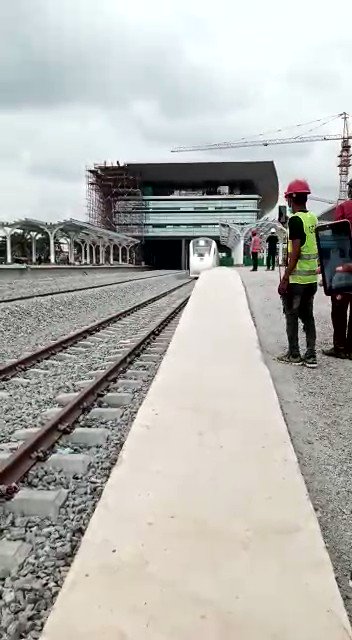The Federal Ministry of Transportation (FMOT) has officially handed over the completed Port Harcourt-Aba section of the Eastern Narrow-Gauge Railway Project to the Nigerian Railway Corporation (NRC).
This handover marks a significant achievement in the ongoing effort to modernize Nigeria’s transportation infrastructure.
The ceremony, which took place in Port Harcourt, saw China Civil Engineering Construction Corporation (CCECC) Nig. Limited, the project contractor, hand over key assets to the Nigerian Railway Corporation (NRC).
These assets include 283.060 kilometers of dismantled tracks, 62.800 kilometers of rehabilitated subgrade, and another 62.800 kilometers of newly laid rail for the main line.
The project also involved the rehabilitation and reconstruction of 27 sets of turnouts, which are crucial for rail switching at stations, as well as the restoration of four steel bridges and one concrete bridge.
Additionally, the contractor rehabilitated 10 existing culverts, reconstructed 12 new ones, and carried out improvements on 35 level crossings.
In total, 33,275 meters of drainage systems were constructed to enhance the railway’s functionality and safety.
The technical specifications and maintenance manuals for the Port Harcourt-Aba section have been submitted to Khairi-Jamub Global Services, the project’s consultant, and to the Federal Ministry of Transportation.
This section is a key part of the larger Eastern Narrow-Gauge Railway Project, which aims to connect five geopolitical zones across the country.
The overall goal is to improve the transportation of goods and passengers, boost trade, and stimulate socio-economic growth in the affected regions.
The successful completion of this section of the railway is seen as a major step forward in Nigeria’s quest for better and more efficient transport systems.
During the ceremony, Ogunade Adesegun, the Deputy Director of Track and Civil from NRC, represented NRC’s Managing Director, Ben Iloanusi.
Adesegun emphasized that the NRC is now responsible for the operation and maintenance of the Port Harcourt-Aba section, which stretches from Kilometer 0 to Kilometer 62.
He explained that the commercial aspect of the rail line has been running smoothly, providing an affordable, faster, and safer means of transportation for both passengers and goods.
“This development is a testament to the government’s efforts to provide efficient transportation systems, and the dividends of these efforts are now materializing,” Adesegun said.
Ayo Dada, a supervisor from the Federal Ministry of Transportation, also spoke at the event, explaining that the delay in the handover was due to the necessary processes and diligence required to ensure the quality and safety of the project.
Dada emphasized that this handover only marks the completion of one segment of the broader Eastern Narrow-Gauge Railway Project, which will be completed in phases.
“The completion of this project is expected to boost the economy of both cities and states, bringing development and growth to the region,” Dada said.
He highlighted that the railway will offer a safer and more efficient transportation alternative, reducing the risks of accidents and congestion often caused by road traffic.
The completion of the Port Harcourt-Aba section is just a glimpse of the larger vision for the Eastern Narrow-Gauge Railway Project, which spans a distance of 1,443 kilometers.
This project is expected to link Port Harcourt, the southeastern oil hub, to Maiduguri, in northeastern Nigeria’s Borno State.
The total cost of the Port Harcourt-Maiduguri rail project is $3.03 billion.
Security was another major point addressed during the ceremony. Engr. Adesegun assured the public that the NRC has already deployed vigilante groups to monitor and protect the tracks and rail assets.
He noted that both the Ministry and the Presidency have implemented security measures to safeguard the rail infrastructure.
This handover and the progress of the Port Harcourt-Aba section are seen as crucial milestones in Nigeria’s transport revolution.
Once completed, the railway will provide an important connection between regions, significantly boosting the local and national economy.

